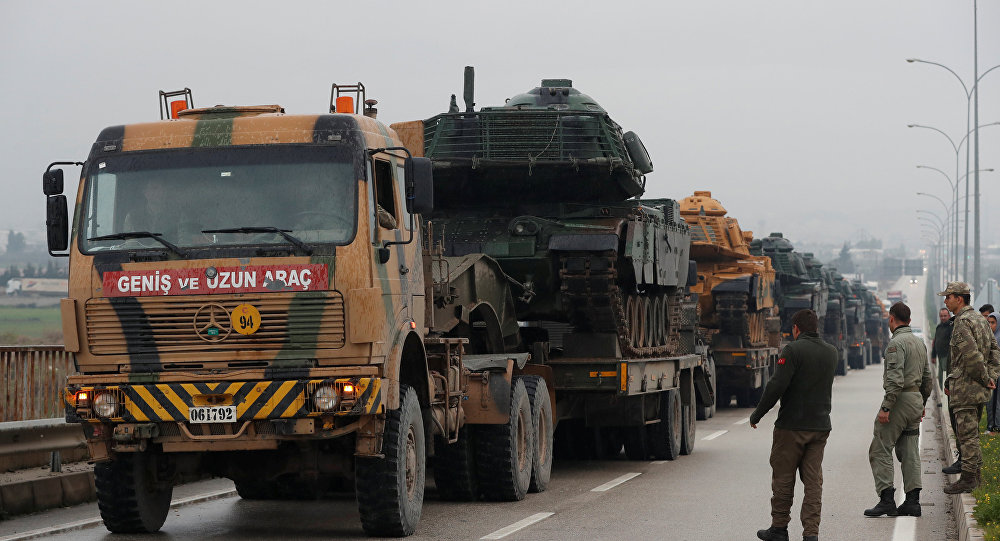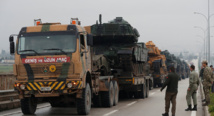Trump expressed concerns about "escalating violence" in Afrin, the Kurdish-held area under attack. In the hours that followed the call, Turkey sent more armoured units to the border area, broadcaster NTV reported.
Erdogan has threatened to expand the Turkish operation in Afrin to Manbij, a northern Syria city that US-backed forces, led by Kurdish fighters, seized from Islamic State in 2016.
The Kurdish fighters and Arab allies say hundreds of their members were killed by Islamic State during the battle for the city, east of Afrin, where the US maintains a military presence.
Turkey controls territory to the west of Manbij. Turkish officials warned that if the US wished to avoid a confrontation with Turkey, Washington had to cut its support for the YPG, the main Kurdish militia in Syria.
The YPG makes up the bulk of the US-backed force defeating Islamic State in Syria. Battles against the Sunni extremist group are ongoing.
"If the US administration does not want to confront Turkey - which it does not, as we Turkey do not either - the way is cutting support to certain terrorists," said Bekir Bozdag, a deputy prime minister.
Bozdag called on the US to retrieve weapons given to the YPG and ensure the group leaves Manbij. Between Afrin and Manbij, Turkey controls a swath of territory in fractured northern Syria.
Brett McGurk, Trump's top envoy in the war against Islamic State, commenting about Afrin on Twitter, warned that a "prolonged operation risks giving life to ISIS as (it is) on the verge of defeat."
The US has prioritized the fight against Islamic State, while Turkey is focused on Kurdish fighters, leading to the divergent views among the NATO members on Syria.
Turkish officials have denied key lines in the White House statement following the phone call between the two presidents. Foreign Minister Mevlut Cavusoglu suggested that the statement could have been written before the two leaders spoke.
"First, we have to build up trust with the USA again," Cavusoglu told reporters in Istanbul, adding there was a "confidence crisis" with Washington.
Turkish Prime Minister Binali Yildirim, speaking in Ankara, said the Afrin operation "continues as planned," while accusing the US of "embracing terrorist groups."
In the phone call, Trump "urged Turkey to de-escalate, limit its military actions, and avoid civilian casualties and increases to displaced persons and refugees." Turkey denies this, with officials saying the talk about Syria was "limited to an exchange of views."
Turkey views the US-backed Kurdish forces as terrorists, charging they have links to Turkish-Kurdish insurgents, but the differences between Ankara and Washington extend to a number of issues that are becoming entangled.
Turkish officials also denied that Trump spoke to Erdogan about "destructive and false rhetoric coming from Turkey," as the US expressed concern about US citizens and employees under arrest in Turkey.
Ankara launched the operation in Afrin on Saturday, using its own troops and allied Syrian rebel fighters.
Late Thursday, the Britain-based Syrian Observatory for Human Rights said at least seven Turkish-backed Syrian rebels and a Tukrish soldier were killed after Kurdish fighters foiled an advance operation into the northern and western parts of the Afrin region.
Two Kurdish fighters were also killed in the attack, the Observatory said.
"The invading Turkish army tried to advance into the Balbala and Rajo areas under a cover of artillery fire," Mustapha Bali, Syrian Democratic Forces' (SDF) press department head, said, "but the operation was foiled and three Turkish tanks were hit and a number of soldiers were killed inside them."
Meanwhile, the autonomous Kurdish-led Afrin administration called upon the Syrian government state to carry out "its sovereign duties towards Afrin and protect its borders with Turkey from attacks by the Turkish occupier."
It added that Syria should deploy its armed forces to secure the borders of the Afrin area.
On January 18, Syria warned Turkey against attacking the Kurdish-controlled region of Afrin.
"If the Turkish air force attacks Syria, it should not consider itself on a picnic," Syrian Deputy Minister of Foreign Affairs Faisal al-Moqdad said.
Erdogan has threatened to expand the Turkish operation in Afrin to Manbij, a northern Syria city that US-backed forces, led by Kurdish fighters, seized from Islamic State in 2016.
The Kurdish fighters and Arab allies say hundreds of their members were killed by Islamic State during the battle for the city, east of Afrin, where the US maintains a military presence.
Turkey controls territory to the west of Manbij. Turkish officials warned that if the US wished to avoid a confrontation with Turkey, Washington had to cut its support for the YPG, the main Kurdish militia in Syria.
The YPG makes up the bulk of the US-backed force defeating Islamic State in Syria. Battles against the Sunni extremist group are ongoing.
"If the US administration does not want to confront Turkey - which it does not, as we Turkey do not either - the way is cutting support to certain terrorists," said Bekir Bozdag, a deputy prime minister.
Bozdag called on the US to retrieve weapons given to the YPG and ensure the group leaves Manbij. Between Afrin and Manbij, Turkey controls a swath of territory in fractured northern Syria.
Brett McGurk, Trump's top envoy in the war against Islamic State, commenting about Afrin on Twitter, warned that a "prolonged operation risks giving life to ISIS as (it is) on the verge of defeat."
The US has prioritized the fight against Islamic State, while Turkey is focused on Kurdish fighters, leading to the divergent views among the NATO members on Syria.
Turkish officials have denied key lines in the White House statement following the phone call between the two presidents. Foreign Minister Mevlut Cavusoglu suggested that the statement could have been written before the two leaders spoke.
"First, we have to build up trust with the USA again," Cavusoglu told reporters in Istanbul, adding there was a "confidence crisis" with Washington.
Turkish Prime Minister Binali Yildirim, speaking in Ankara, said the Afrin operation "continues as planned," while accusing the US of "embracing terrorist groups."
In the phone call, Trump "urged Turkey to de-escalate, limit its military actions, and avoid civilian casualties and increases to displaced persons and refugees." Turkey denies this, with officials saying the talk about Syria was "limited to an exchange of views."
Turkey views the US-backed Kurdish forces as terrorists, charging they have links to Turkish-Kurdish insurgents, but the differences between Ankara and Washington extend to a number of issues that are becoming entangled.
Turkish officials also denied that Trump spoke to Erdogan about "destructive and false rhetoric coming from Turkey," as the US expressed concern about US citizens and employees under arrest in Turkey.
Ankara launched the operation in Afrin on Saturday, using its own troops and allied Syrian rebel fighters.
Late Thursday, the Britain-based Syrian Observatory for Human Rights said at least seven Turkish-backed Syrian rebels and a Tukrish soldier were killed after Kurdish fighters foiled an advance operation into the northern and western parts of the Afrin region.
Two Kurdish fighters were also killed in the attack, the Observatory said.
"The invading Turkish army tried to advance into the Balbala and Rajo areas under a cover of artillery fire," Mustapha Bali, Syrian Democratic Forces' (SDF) press department head, said, "but the operation was foiled and three Turkish tanks were hit and a number of soldiers were killed inside them."
Meanwhile, the autonomous Kurdish-led Afrin administration called upon the Syrian government state to carry out "its sovereign duties towards Afrin and protect its borders with Turkey from attacks by the Turkish occupier."
It added that Syria should deploy its armed forces to secure the borders of the Afrin area.
On January 18, Syria warned Turkey against attacking the Kurdish-controlled region of Afrin.
"If the Turkish air force attacks Syria, it should not consider itself on a picnic," Syrian Deputy Minister of Foreign Affairs Faisal al-Moqdad said.









 Home
Home Politics
Politics











